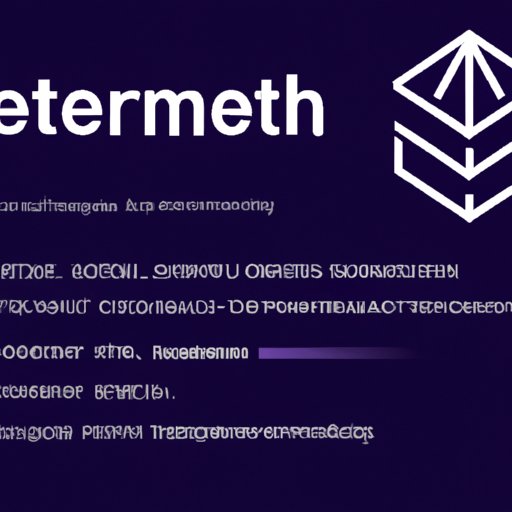Introduction
A smart contract is a computer protocol designed to digitally facilitate, verify, or enforce the negotiation or performance of a contract. In other words, it is a set of rules that can be executed by computers without any human intervention. Smart contracts are used to automate complex processes and transactions, such as financial agreements, real estate deals, and insurance policies. Ethereum is one of the most popular platforms for writing smart contracts. In this article, we will explore how to write a smart contract on Ethereum.
What is Necessary to Create a Smart Contract on Ethereum?
In order to create a smart contract on Ethereum, you need to have an understanding of the Ethereum Virtual Machine (EVM) and the Solidity programming language. The EVM is a blockchain-based computing platform that runs smart contracts. It is responsible for executing code and interacting with the Ethereum network. Solidity is a programming language specifically designed for writing smart contracts on the Ethereum blockchain. It is a statically typed, object-oriented language that is compiled into bytecode and deployed to the Ethereum blockchain.
In addition to understanding the fundamentals of Ethereum and Solidity, you also need access to an Ethereum blockchain network. You can either use a public Ethereum network, such as the mainnet, or you can set up a private Ethereum network for testing purposes. Once you have access to an Ethereum network, you can begin writing your smart contract.

Benefits of Using Ethereum for Writing Smart Contracts
There are several benefits to using Ethereum for writing smart contracts. First, Ethereum is an open-source platform, which means that anyone can access it and start building applications. This makes it easier for developers to get started and eliminates the need for a central authority. Second, Ethereum provides increased security and reliability compared to other platforms. Transactions are cryptographically secured and verified on the blockchain, which reduces the risk of fraud or malicious activity. Finally, Ethereum offers reduced costs for transactions and interactions, since the fees associated with transactions are much lower than those of traditional systems.

Examples of Smart Contracts Written on Ethereum
There are a number of examples of smart contracts written on Ethereum. One example is a decentralized exchange (DEX), which allows users to trade digital assets without the need for a centralized intermediary. Another example is digital identity verification, which enables users to securely store and manage their digital identities on the blockchain. Finally, tokenized assets are another example of a smart contract written on Ethereum. These tokens represent real-world assets, such as stocks, bonds, and commodities.
Comparison of Different Types of Smart Contracts and Their Use Cases
When it comes to writing smart contracts on Ethereum, there are two main types: open source and closed source. Open source contracts are available to anyone and can be modified by anyone. Closed source contracts are not publicly accessible and cannot be modified by anyone but the contract creator. Additionally, smart contracts can be classified as permissioned or permissionless. Permissioned contracts require users to be authorized before they can interact with the contract. Permissionless contracts do not require authorization and can be interacted with by anyone. Finally, smart contracts can be classified as on-chain or off-chain. On-chain contracts exist on the Ethereum blockchain and are immutable. Off-chain contracts exist outside of the blockchain and can be modified.
Conclusion
Writing a smart contract on Ethereum is a relatively straightforward process. It requires an understanding of the Ethereum Virtual Machine and the Solidity programming language, as well as access to an Ethereum blockchain network. There are several benefits to using Ethereum for writing smart contracts, including ease of use, increased security and reliability, and reduced cost of transactions and interactions. There are also a number of examples of smart contracts written on Ethereum, such as DEXs, digital identity verification, and tokenized assets. Finally, there are different types of smart contracts, such as open source, closed source, permissioned, permissionless, on-chain, and off-chain, each with its own use cases.
Overall, writing a smart contract on Ethereum is a great way to automate complex processes and transactions. It offers increased security and reliability, as well as reduced cost of transactions and interactions. With the right knowledge and resources, anyone can write a smart contract on Ethereum.
(Note: Is this article not meeting your expectations? Do you have knowledge or insights to share? Unlock new opportunities and expand your reach by joining our authors team. Click Registration to join us and share your expertise with our readers.)
